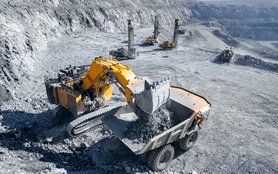The recent Dodd-Frank 1504 disclosures offer important new information on critical minerals and the oil and gas assets’ potential to be stranded
The fossil fuel industry has a long history of hiding information about its operations. For decades, major oil and gas companies sowed doubt about climate change, despite knowing internally since the 1950s how their products were going to change the atmosphere. But after fighting anti-corruption and tax disclosure rules for more than fourteen years, these companies have one less thing they can keep secret: the payments they make to governments in exchange for oil, gas, and minerals.
At the end of September, businesses in the resource extraction sector were required to publicly disclose the taxes, fees, and royalties they pay to governments for the first time. This requirement was originally passed in 2010 as part of the post-financial crisis Dodd-Frank Act, but only came into effect last month after years of wrangling and delay. With this data now public, people around the world have a new tool in the fight against climate change.
Are we selling our future too cheaply and subsidizing climate destruction?
While fossil fuel companies have long touted the contributions they make to government revenues and development, particularly in lower-income countries, they have sought to deny and deflect questions about the tax breaks they receive in many countries. Until now, lack of access to data on the payments US-listed companies make to governments has made it difficult to evaluate how much they are contributing to, and extracting from, countries around the world. With this new public payments data, it is now possible to consider the revenues that governments gain from fossil fuel extraction in light of the harms the fossil fuel projects cause – including social and environmental damages and the climate impacts caused by burning those fuels. Though many impacts of resource extraction are hard to put into dollar terms, like mass displacement and gendered violence, combining payment disclosures with country-specific projections of climate change costs countries can see more clearly how cheaply they are selling their own future.
For example, Papua New Guinea received $859.3 million from U.S.-listed oil and gas companies in 2023. Almost all of this revenue came from Exxon Mobil, primarily from taxes ($500.4 million) and dividends ($357.7 million). This is a non-trivial amount of money, representing 2% of the country’s GDP. But Papua New Guinea is also the tenth most climate-vulnerable country in the world. From a strictly financial perspective, more of Papua New Guinea’s income is at risk from climate change than any other country in the Pacific, with the Asia Development Bank projecting that “severe failures in sweet potato crops and other agricultural products and the increased economic burdens of cooling, mortality and land depletion, could trigger a loss of up to 15.2% of its GDP by 2100.”
Payments data, along with information about project costs and emissions, allow people to see how much countries depend on projects at risk of asset stranding, or projects being abandoned because they lose financial viability with changed cost assumptions. Many resource contracts postpone the bulk of their payments to governments for years, until companies’ initial investment costs have been recouped. But as renewable energy costs continue to fall and decarbonization speeds up, companies will come under increasing pressure to reduce their exposure to the highest-emitting fuels and pull back from the costliest projects. Many fossil fuel projects will lose profitability earlier than expected or fail to become profitable at all. Because of the deferral of payments to governments, much of the anticipated revenue for these projects will never arrive.
Being clear-eyed about the real returns from existing fossil fuel projects is also crucial to avoiding bad investments in new extraction. As oil supermajors begin offloading assets in response to climate change and regulatory pressure, national oil companies are emerging as buyers. Data on payments to governments provide important insight into these companies, many of which hide details about their operations from their own citizens. Armed with this information, citizens are better-placed to assess the investments their national oil companies are making.One in three national oil companies is planning to spend more than a third of their investment money on projects that will fail to break even given current climate commitments. Payments data can help sort out whether companies are making reasonable investments or just amassing more stranded assets, which could create catastrophic levels of economic risk for the citizens of developing countries dependent on these resources, who may have to finance bailouts of national oil companies through public debt.
Toward a just energy transition
Keeping the climate within safe bounds will require leaving most existing oil, gas, and coal reserves in the ground. This makes it all the more important to plan a just transition, in which information asymmetry and corruption doesn’t stick developing countries with the ruins of an extractive economy and where the revenues that countries receive for their remaining natural resources are apportioned fairly and in ways that contribute to their development.
Payments data can help decide which countries should have the right to extract remaining reserves or receive compensation, by showing which vulnerable countries are most economically dependent on fossil fuel revenues for providing public services. Emissions around the globe are grossly unequal: people in the top 1% of the income distribution emit as much as people in the bottom 66%. All countries must begin transitioning away from producing and consuming fossil fuels, but a fair path would allow poorer countries more time than rich ones. Planned decarbonization that takes these inequalities into account is possible and necessary. Payments data can also support international climate finance efforts, helping governments and citizens assess whether incentives are sufficient to motivate a shift away from fossil fuel extraction.
Shedding light on critical minerals
These new payments data offer information not only on fossil fuels, but provide information on the critical minerals that are vital to decarbonization. As the importance of a rapid transition becomes clearer every year, some are calling for looser rules and fast-tracked approvals for critical minerals projects. But even as these projects are crucial for climate change mitigation, mining projects also carry significant environmental and social harms. Having transparent data on payments enables a broader, more inclusive debate about where these projects should be approved and how much companies should have to pay. This debate, in turn, should help governments, companies, and citizens avoid some of the negative impacts of previous resource booms.
Rather than assuming that the fastest route to a clean energy transition must trample the rights of local people, projects with a social license to operate may end up facing fewer barriers, less risk, and ultimately lower costs over the long-term. There is a growing awareness that local legitimacy is important for project viability. And it is possible for countries to meaningfully engage with project-affected communities, including respect for Indigenous peoples’ right to free prior, and informed consent. But genuine consultation and deliberation depends on an open exchange of information, which includes knowing how much companies really pay for their extractive projects.
Toward a more transparent future
While these long-overdue disclosures give us important information about oil, gas, and mineral extraction, they do not present the full picture. In the years since the Dodd-Frank legislation was first introduced, Oxfam and our allies have been fighting for other key disclosures. For example, we need companies and governments to disclose their mineral resource contracts, so we can see not only how much companies are paying for natural resources, but what they should be paying. We need companies to disclose their country-by-country tax reporting to show whether they are engaging in overly aggressive tax practices, or shifting their profits out of the countries where they’re extracting resources. We need beneficial ownership disclosure to know who the real owners of companies are and whether they are politically exposed persons, who might be making laws to benefit their financial interests. And we need disclosures of reserves, subsidies, price assumptions, and emissions to make sound energy transition plans that accurately understand climate impact.
As both the ultimate source of most greenhouse gas emissions and a crucial player in replacing those emissions, the resource extraction sector is at the heart of the climate challenge. Whether assessing the impact of fossil fuel extraction, planning a just transition, or avoiding harms in critical mineral extraction, governments and activists need access to information about this sector to do their jobs properly. The release of this extractive payments data is not the last piece of the transparency puzzle, but it is an important one.



